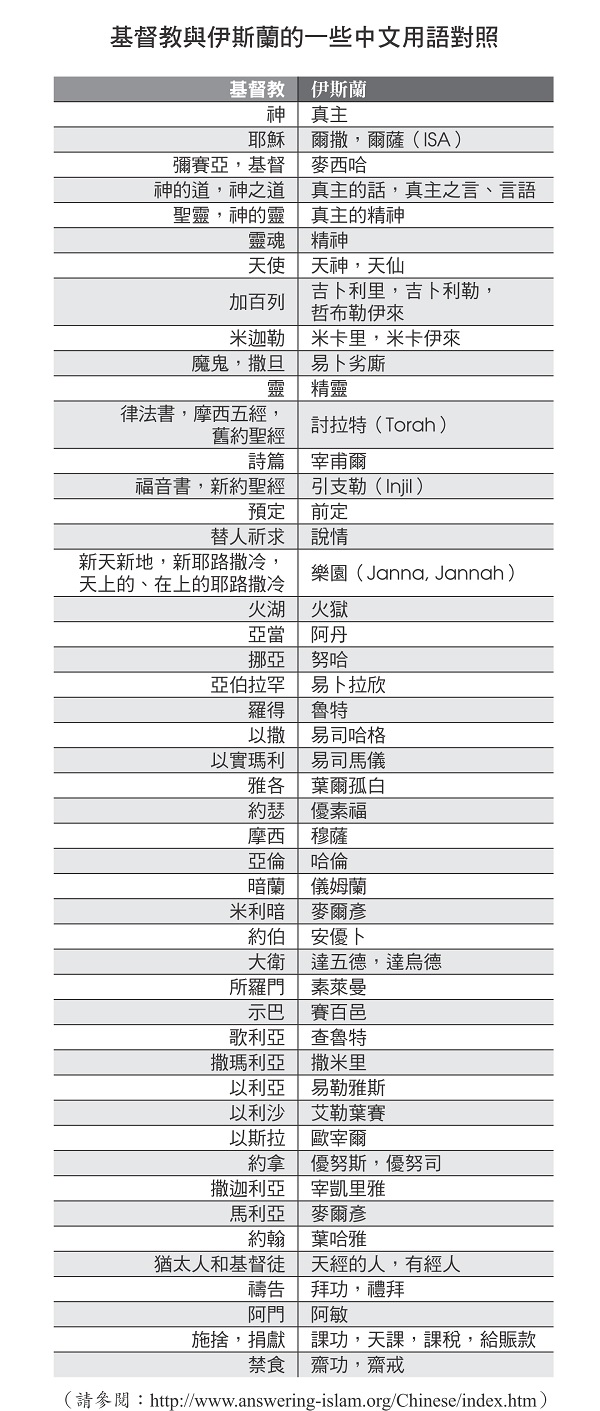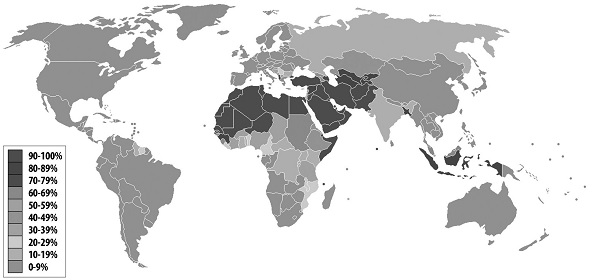Understanding Islam and Muslims

Whenever someone mentions Islam or Muslims, what do you think of?
Whenever you recite the Lord's Prayer, "Thy kingdom come," what emotions and thoughts do you feel? Do you think of the Islamic world?
Whenever you read John 3:16, do you think that the people God loves include Muslims?
1. Islam
Simply put, "Islam" means obedience to God (Allah); "Muslim" (Muslim) is a person who obeys and practices Islamic law, or a person who obeys God (Allah). Islam is the name of religion and Muslims are believers. Both words come from the same root.
Since the main belief of the Hui people in China is Islam, the Chinese call it Islam. However, we suggest that now that you understand the meaning of "Islam" and "Muslim", please use the two names you learned today as much as possible in the future.
2. The Origin and Initial Development of Islam1, 2, 3
Islam was founded by Muhammad in Mecca on the Arabian Peninsula. At that time, the Arabs formed many tribes and worshiped idols. According to Muslims, in 610 AD, when Muhammad was meditating in a cave on Mount Hira near Mecca, the archangel Gabriel (Gabriel) appeared to him and conveyed to him the revelation and instructions of God (Allah). . Within ten years after he came out to preach, the number of believers in Mecca slowly increased, and he also encountered a lot of hostility and persecution.
In 622 AD, he moved to Medina, and the first year of the Islamic calendar began. And it uses a monthly calendar (lunar calendar), with only 354 days in a year (different from the Western calendar). This year is 1431 in the Islamic calendar. Later, he became the military, political and religious leader of Medina, conquered various tribes by force, annexed Mecca, and unified the Arabian Peninsula. He abolished idolatry and respected God alone. He advocated praying facing Mecca five times a day and designated Friday as the day for all people to worship in the mosque. Died in Medina in 632 AD.
In the one hundred years after his death, Islam spread to Spain in the west, India in the east, and then spread throughout South and Southeast Asia. Today Muslims are spread all over the world. After his death, his successors recorded his oral revelations and wrote them into the Qur'an. In addition, his remarks, personal habits and actions are recorded in the Hadiths and are regarded as a model of Muslim life.

3. Muslim Beliefs
Muslims believe:God (monotheism), who is the creator of all things; angels and evil spirits; prophets: such as Abraham (called Ibrahim in the Qur'an), Moses (Musa), David (Dawud), Jesus (Isa) ), Muhammad; holy books (Pentateuch, Gospels, Old Testament Psalms, Quran); Judgment Day and destiny.
Muhammad is revered by Muslims as the greatest and last prophet. He met many people who claimed to be Christians during his life. He also learned many Jewish religious customs from the Jews living in Mecca and Medina. Christian and Jewish ideas, concepts, and histories are found throughout the Qur'an, but are often distorted.
Muslims do not believe:They can know God (Allah), they can only know things about God. This God has 99 names, but Christians have a title for God that they do not have, which is "Abba, Father." There is a living connection between us and God. God is the God who embraces us. This kind of intimate relationship is something that Muslims cannot imagine and long for.
Muslims are monotheists and therefore do not believe in the Trinity. They believe that Christians who speak of the Trinity are polytheists and idolaters. Because Muslims believe that God is holy and has no wife, so he has no sons. Therefore, they did not acknowledge that Jesus was the Son of God, the Word made flesh. They also have no concept of original sin.
What Muslims think of Jesus is:Jesus was a righteous man and a good prophet, and he did not die on the cross. Because according to God’s righteous nature, it is impossible to humiliate a good person and cause him to die miserably. Furthermore, God has a way of rewarding and punishing each other, and everyone is responsible for their sins, so there is no such thing as being punished for one's sins. Although many verses in the Qur'an say that Jesus is the "Word of God" and the "Messiah," they do not know what they mean, and they do not know that this Messiah is their savior.
To sum up, they do not understand the meaning of atonement and salvation.
4. Muslim religious life
A devout Muslim must practice the following five things in life, which are called the five good deeds (or the five deeds of heaven):
(1) Chanting exercises/reciting the creed (shahada):"There is no god but Allah. Muhammad is his prophet." This sentence must be recited in a person's ears when he is born or dying.
(2) Prayer (salat):Pray five times a day facing Mecca at fixed times.
(3) Lesson work (zakat):Help the poor voluntarily or voluntarily.
(4) Saum:Ramadan is a month of fasting and abstinence from sunrise to sunset for the entire month.
(5) Chao Gong (hajj):Make a pilgrimage to Mecca at least once in your life to commemorate the long journey of Abraham in ancient times to sacrifice his beloved son Ishmael (unlike the Bible).
5. Current Situation of the Islamic World
1. Total population and distribution:
(1) According to Joshua’s plan4 According to current data, the total global population is 6.7 billion, and the Muslim population is 1.5 billion. In other words, one in every 4 to 5 people in the world is a Muslim. It is the second largest religion in the world after Christianity in its population.
(2) The countries with the largest Muslim population are all in Asia: Indonesia 270 million, Pakistan 160 million, India 145 million, and Bangladesh 132 million. Due to war, famine, studying abroad, immigrating, working, doing business, getting married, traveling, etc., Muslims have spread all over the world. For example, there were 80,000 Indonesian workers in Taiwan (2007), 110,000 to 120,000 in Hong Kong, and 40,000 in South Korea.
2. Mu Xuan’s current situation:
Judging from the current missionary situation, Muslims are the most unreached people in the world/the group least exposed to the gospel. However, Christians know very little about them and generally do not pay attention to Muslim work. Of course, there are many difficulties to be faced.
(1) The total number of ethnic groups in the world is 16,352; the number of unreached peoples/ethnic groups least exposed to the gospel is 6,650; 2,704 of them are Muslim ethnic groups. 55
(2) There are many Muslim groups who only have language but no writing; or they have writing but no Bible. Therefore, basic projects such as character creation, literacy education, and Bible translation require a huge investment of various resources. Especially the ethnic groups in Indonesia, continental Asia, Southeast Asia, Central Africa and Nigeria. 66
(3) Resource distribution: There are only 3 Christian missionaries for every 1 million Muslims who have not been reached by the gospel; less than 1% of the church budget is used to support missionaries to work in the groups where the gospel has not reached, and less than 1% is spent on evangelism The unreached Muslims have even less. 77
(4) Religious persecution: In 2010, the top ten countries that most severely persecuted Christians in the world were North Korea, Iran, Saudi Arabia, Somalia, Maldives, Afghanistan, Yemen, Mauritania, Laos, and Uzbekistan. Except for North Korea and Laos, the rest are countries dominated by Islamic beliefs. 88

▲Overview of global Muslim population distribution
6. How Christians Respond to Challenges
Christians should take Revelation 5:9 as the ultimate goal of life and ministry. Here are some feasible things to do.
1. Prayer and tools to help pray
(1) Pray for yourself and other Christians:Ask God the Father to do the work of cleansing, enlightening, and strengthening our hearts so that we can view Muslims from the eyes of God the Father and cultivate a love for Muslims and a heart that is not afraid of hardships to participate in Muslim propaganda.
(2) Pray for the Muslim world:Not only do we pray for them to enter the Kingdom of God, but we also pray for them from a humanitarian standpoint. Since the 21st century, natural and man-made disasters have continued in the Muslim world, and the majority of people have suffered terribly, especially women and children.
(3) Chinese prayer books or online resources can be used:Such as "World Mission Manual", "30 Days of Prayer for the Muslim World" Manual, "Mission Day Guide", "Prayer for the Arabian Peninsula", etc. For more information on intercessory prayer, please refer to Appendix 2 of the Chinese version of "World Mission Handbook". 99
2. Popularize universal missionary education:World mission education is not something that happens occasionally. The church needs to plan and teach children, youth, and adults about world missions on a daily basis. Theological colleges need to strengthen their universal evangelism courses and set up a dedicated Muslim evangelism group to encourage the elite soldiers of the Kingdom of God to brave the difficulties and open up the Muslim field. For example, the Kairos missionary course (a simplified version of Perspectives) is offered in more than 30 countries and is a very good introductory course to missionary education. 1010
3. Establish a Chinese archives database for ethnic groups not yet reached by the gospel to help the Chinese participate in the unfinished work.
4. Adopt ethnic groups that have not been reached by the gospel:11 Cooperate with other churches, missionary agencies, and various ministries such as Bible translation, church planting, humanitarian aid, etc., participate in prayer, set plans and goals, and concentrate manpower, material resources, and financial resources to help Muslim groups that have not been reached by the gospel know the Lord. . Individuals or groups can participate.
5. Understand Islamic culture:When evangelizing Muslims, the differences and misunderstandings caused by cultural differences are far greater than the difficulties caused by theological differences. Christians should get rid of prejudices, be humble, learn Islamic culture, and use creativity to preach the gospel in a way suitable for local culture.
6. Make good use of modern technology:For example, setting up a Christian website with ethnic cultural characteristics can be viewed by people in areas with Internet access; or downloading Bibles, hymns, or the biography of Jesus in specific languages into pocket-sized, audio-visual, and cheap electronic products and giving them to people.
7. Learn to be a storyteller:Have you ever thought about how to preach the gospel to people who are illiterate or illiterate in remote, backward, and poor areas? (www.bibletelling.com, www.christianstorytelling.com)
8. Support/train local Christian workers to do localized evangelism:For example, Gospel for Asia.
9. Care for the persecuted followers of Jesus in the Islamic world.
10. Pay attention to women and children’s ministry.

A surprising example of a Muslim converting to Christianity
Mark A. Gabriel, an academic genius who has been "soaked" in the Quran and the life of Muhammad throughout his life, and who teaches at an Islamic university; why did he develop the desire to pursue the true God?
After meeting Jesus and finding the truth, he was constantly condemned and hunted.
What his mental journey conveys is...
Please read the full text onlinehttp://boxun.com/hero/2007/yanminruwenji/7_1.shtml
References:
1. www.30-days.net
2. "30 Days of Prayer for the Muslim World" Chinese version, Taipei, Campus Publishing, 2007, 2008, 2009 editions.
3. www.answering-islam.org/chinese
4. www.joshuaproject.net
5. Same note 4
6. www.wycliffe.org
7. Same note 4
8. www.opendoorusa.org
9. "Handbook of World Mission" (21st Century Chinese Edition), edited by Johnston and Vandyk, published by the Great Commission Center. (The country names in this article are based on the translated names in the Handbook of World Mission.)
10. www.kairoscourse.org11. Same note 8
Author profile
Jane China, pen name, is currently a project co-worker of the Chinese Wycliffe Translation Association (Taiwan), promoting missionary work in North America and Southeast Asia. I enjoy spending time with my grandchildren the most.
